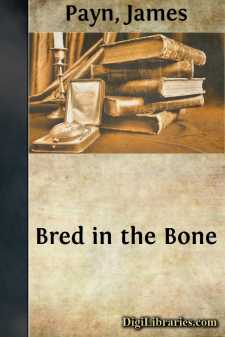Categories
- Antiques & Collectibles 13
- Architecture 36
- Art 48
- Bibles 22
- Biography & Autobiography 813
- Body, Mind & Spirit 142
- Business & Economics 28
- Children's Books 14
- Children's Fiction 11
- Computers 4
- Cooking 94
- Crafts & Hobbies 4
- Drama 346
- Education 46
- Family & Relationships 57
- Fiction 11828
- Games 19
- Gardening 17
- Health & Fitness 34
- History 1377
- House & Home 1
- Humor 147
- Juvenile Fiction 1873
- Juvenile Nonfiction 202
- Language Arts & Disciplines 88
- Law 16
- Literary Collections 686
- Literary Criticism 179
- Mathematics 13
- Medical 41
- Music 40
- Nature 179
- Non-Classifiable 1768
- Performing Arts 7
- Periodicals 1453
- Philosophy 64
- Photography 2
- Poetry 896
- Political Science 203
- Psychology 42
- Reference 154
- Religion 513
- Science 126
- Self-Help 84
- Social Science 81
- Sports & Recreation 34
- Study Aids 3
- Technology & Engineering 59
- Transportation 23
- Travel 463
- True Crime 29
Bred in the Bone
by: James Payn
Description:
Excerpt
CHAPTER I.
CAREW OF CROMPTON.
Had you lived in Breakneckshire twenty years ago, or even any where in the Midlands, it would be superfluous to tell you of Carew of Crompton. Every body thereabout was acquainted with him either personally or by hearsay. You must almost certainly have known somebody who had had an adventure with that eccentric personage—one who had been ridden down by him, for that mighty hunter never turned to the right hand nor to the left for any man, nor paid attention to any rule of road; or one who, more fortunate, had been "cleared" by him on his famous black horse Trebizond, an animal only second to his master in the popular esteem. There are as many highly colored pictures of his performance of this flying feat in existence as there are of "Dick Turpin clearing the Turnpikegate." Sometimes it is a small tradesman cowering down in his cart among the calves, while the gallant Squire hurtles over him with a "Stoop your head, butcher." Sometimes it is a wagoner, reminding one of Commodore Trunnion's involuntary deed of "derring-do," who, between two high banks, perceives with marked astonishment this portent flying over himself and convoy. But, at all events, the thing was done; perhaps on more than one occasion, and was allowed on all hands not only as a fact, but as characteristic of their sporting idol. It was "Carew all over," or "Just like Carew."
This phrase was also applied to many other heroic actions. The idea of "keel-hauling," for instance, adapted from the nautical code, was said to be practically enforced in the case of duns, attorneys, and other objectionable persons, in the lake at Crompton; while the administration of pommelings to poachers and agriculturists generally, by the athletic Squire, was the theme of every tongue. These punishments, though severe, were much sought after by a certain class, the same to which the purchased free and independent voter belongs, for the clenched fist invariably became an open hand after it had done its work—a golden ointment, that is, was always applied after these inflictions, such as healed all wounds.
Carew of Crompton might at one time have been member for the county, if he had pleased; but he desired no seat except in the saddle, or on the driving-box. He showed such skill in riding, and with "the ribbons," that some persons supposed that his talents must be very considerable in other matters, and affected to regret their misuse; there were reports that he knew Latin better than his own chaplain; and was, or had been, so diligent a student of Holy Writ, that he could give you chapter and verse for every thing. But it must be allowed that others were not wanting to whisper that these traits of scholarship were greatly exaggerated, and that all the wonder lay in the fact that the Squire knew any thing of such matters at all; nay, a few even ventured to express their opinion that, but for his recklessness and his money, there was nothing more remarkable in Carew than in other spendthrifts; but this idea was never mooted within twenty miles of Crompton....



